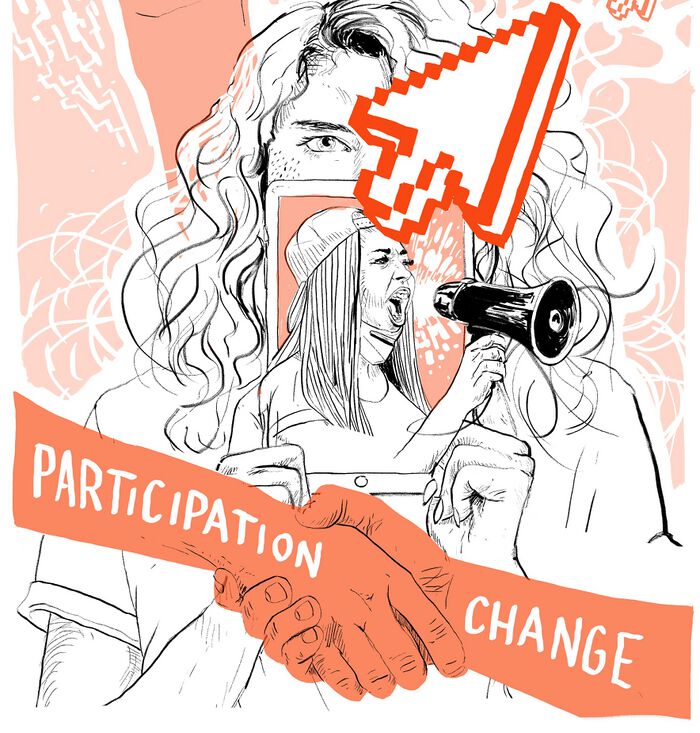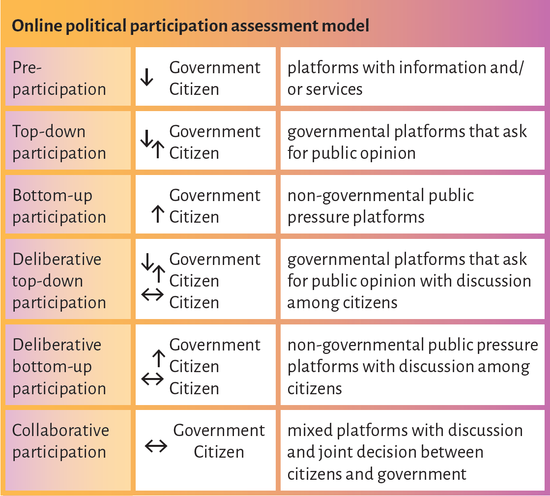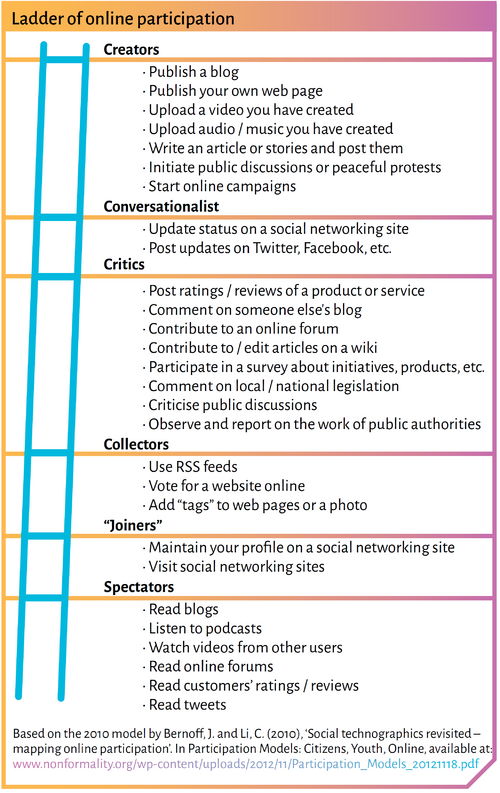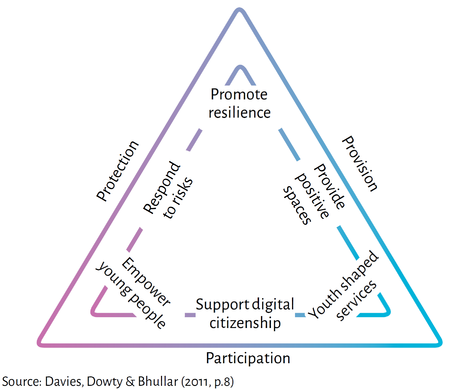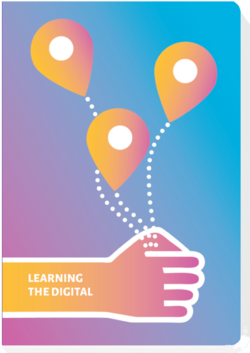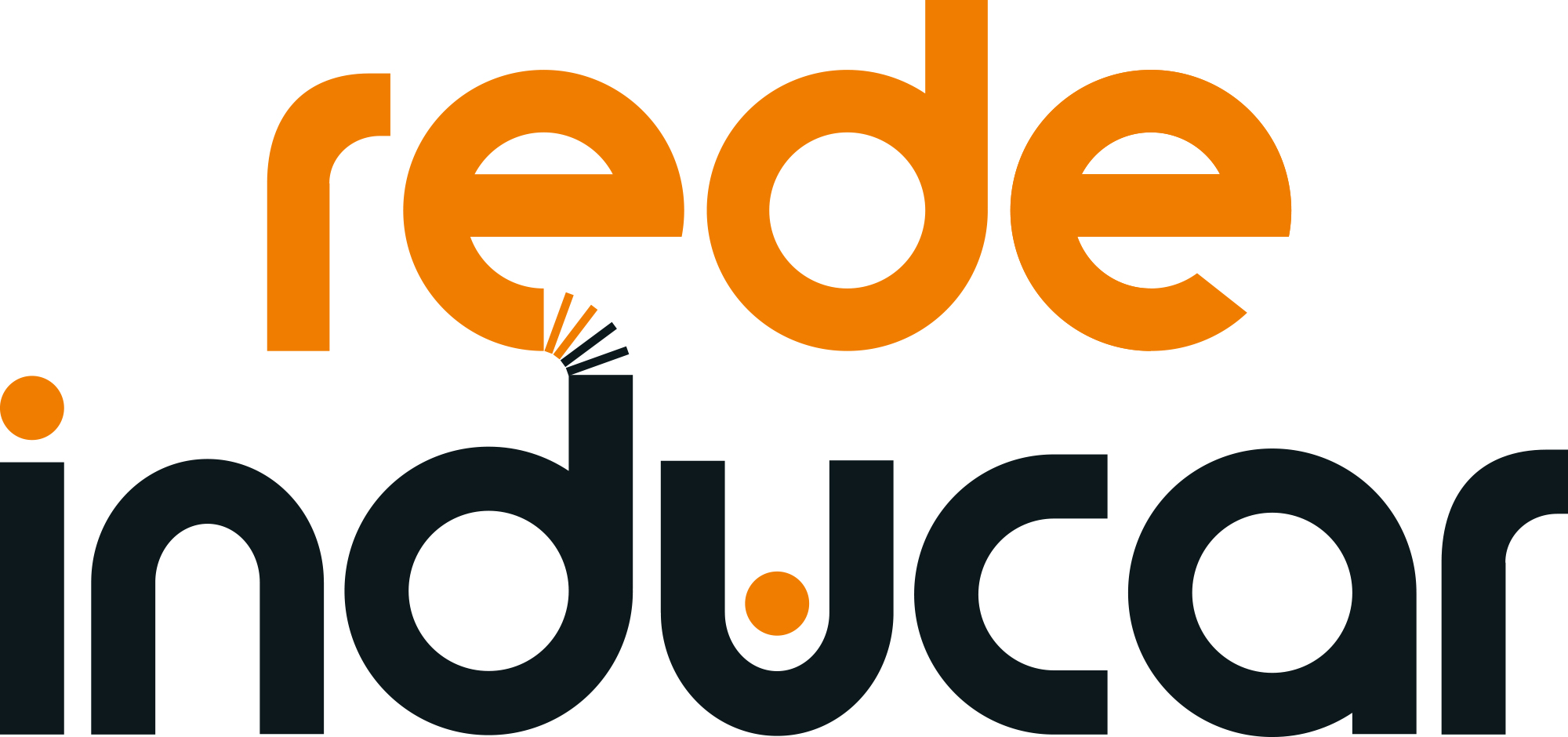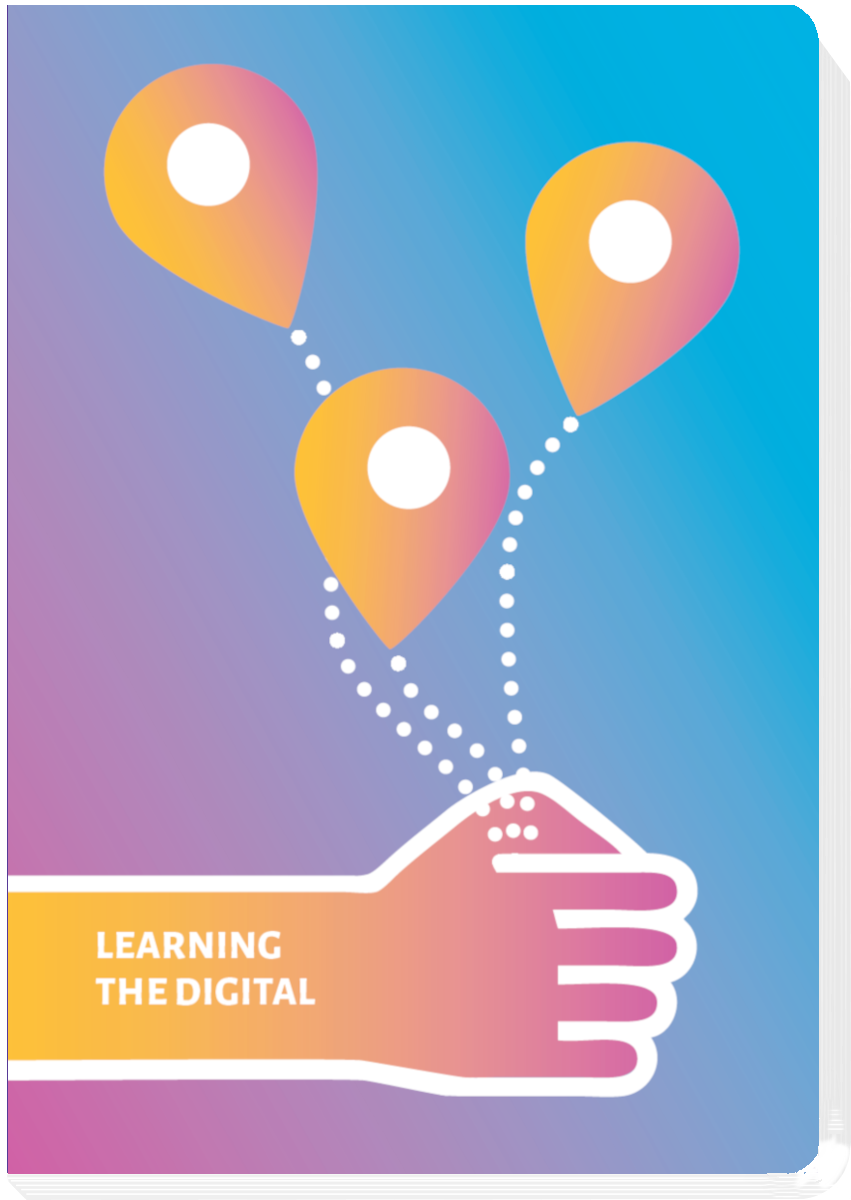One example of social media influence on decision-making in the European context is Brexit. In addition, in many European countries, we find examples of online campaigns for citizens' causes. For politicians, the number of followers on social media has become a necessity and players new to influencing social discourse, such as celebrities, have entered the scene. Tools for social transformation, community mobilising and active political participation are increasingly digital, with digital activism in the forefront of many fields of political activism. We will explore several online spaces and tools for participation and learning. This chapter provides information about how models of participation can be applied to the digital sphere. It gives inspiration for digital activism and how active citizens can share their stories, knowledge and causes.
Contents
Qualitative participation - a matter of technology?
Governments worldwide are realising the advantages of increased online participation, with a myriad of platforms at different levels of governance popping up. There is a “significant growth in participatory platforms in […] the world, however with more rhetorical than practical effects: the majority of the initiatives are promoted by top-down style governmental electronic portals, with little or no influence in the real decision-making process. […]
Power – and not technology – is the key obstacle for effective online citizen participation, whose barriers are nurtured by a traditional political elite with little interest in building a transparent, inclusive and collaborative democracy”.
(Santini & Carvalho, 2019).
Digital platforms for citizen participation in decision-making are increasingly used by public institutions to promote dialogue and exchange, especially at the local level. Although there has been a progressive increase in the use of these tools by citizens, it cannot be said that this has had a decisive impact on the way public decisions are made. On the contrary, as is often the case even in the mechanisms put into practice by public institutions, consultation processes become a way of caring more about appearances than content (see the scale of offline and online participation). The majority of the participation process could be classified as “pre-participative” or “bottom up”. It means that public institutions and/or the government are leading the mechanism. “Participation represents little more than opportunistic rhetoric on the part of political representatives. Several online governmental initiatives communicate a promise of promoting civic participation, but are, in practical terms, complex, closed platforms, controlled and monitored by their managers and with very little or no feedback about the result of the participation, characterizing a kind of “participation washing” (Santini and Carvalho, 2019, p. 177).
Relations between power and citizens
For activists and educators promoting digital participation, a critical view into the mechanisms of online participation and the tools used seems to be helpful, because these processes carry several risks. In the worst case, these risks include hidden informal hierarchies and power structures; authoritarian management manner; manipulative participation; and the rise of a new kind of populism (Santini and Carvalho, 2019). Risks that partly concern the management of power by public institutions and therefore are not only related to the digital sphere but also require specific attention as the digital sphere changes their characteristics.
The sharing of information and the transfer of a part of power are two crucial elements in identifying participatory processes in which decisions are taken jointly between public institutions and citizens. Citizens, indeed, must be put in a position to express their opinion by having as much information as possible in order to make an informed contributions to decision-making. The total or partial lack of transparency of public data is a risk and problem that must be countered in order to promote truly inclusive and effective participatory processes (Jiang and Xu, 2009).
A step backwards on the part of the institutions is needed via power-sharing in decision-making , e.g., by creating control and audit agencies to ensure transparency and accountability of political acts. On the other hand, citizens need to step up to demand transparency in public decision-making, the assumption of responsibility for monitoring the work of decision makers and initiating bottom-up participatory processes.
The ladder of participation
Analogue to Arnstein's ladder of participation we might also explore the opportunities for citizens to involve in a digitally facilitated participatory process or arrangement. The model might also help learners to reflect their habit and attitude toward participation (see also: Task: Online participation.
Reflection
Discuss the following questions in regard to the discourse and practices in your country or area. Try to imagine effective participative processes that may develop.
- What offerings and tools for e-participation exist?
- Does e-governance imply a real change in power dynamics? Does technology allow for a more democratic and participatory governance? What are the barriers in place for effective democratic participation?
- How can civil society organise itself in a digital way to foster active participation and to bring effective social change? And what are the relationships between online and offline activism and social movements?
- What is your attitude in regards to online participation? Task: Online participation
Six principles of online participation
The six principles of online participation begin with the UN Convention on the Rights of the Child (UNCRC), which provides an internationally agreed foundation for policy and practice with respect to young people. There are three main categories: provision rights; protection rights; and participation rights. The resulting triangle collapses with any side removed – each set of rights is essential to support the full realization of others. No set of rights supercede the others in the triangle (Davies, Dowty & Bhullar, 2011, p.8)
Inspiration: Dave Meslin: Antidote for Apathy
This TED Talk sets the starting point for anyone who wants to promote civic participation. Why aren’t people more involved in their local communities? Is it simply apathy? Dave Maslin would say quite the contrary, and he sets to identify seven barriers that prevent people from taking part, even when they want to:
Further:
References
- Council of Europe (2020). Bookmarks. A Manual for Combating Hate Speech Online through Human Rights Education. Revised edition (2020). Keen, E. & Georgescu, M. with contributions from Chernykh, O., Pandea A-R and Valtere S., Council of Europe Publishing, Strasbourg. https://rm.coe.int/bookmarksen2020-web2/16809e5789
- Davies, T.; Dowty, T.; Bhullar, S. (2011). Rethinking Responses to Children and Young People’s Online Lives. EU Kids Online 2 – Final Conference, LSE, United Kingdom. (In Press). https://eprints.soton.ac.uk/273226/
- Santini, R. M., Carvalho, H. (2019). Online platforms for citizen participation: meta-synthesis and critical analysis of their social and political impacts. (Plataformas online de participação cidadã: meta-síntese e avaliação crítica de seus impactos sociais e políticos). Comunicação e sociedade [Online], 36 | 2019, Online since 20 December 2019, connection on 06 October 2021. https://doi.org/10.17231/comsoc.36(2019).2350
- Jiang M, Xu H., (2009) Exploring Online Structures on Chinese Government Portals: Citizen Political Participation and Government Legitimation. Social Science Computer Review. 2009;27(2):174-195. https://doi.org10.1177/0894439308327313
Inês Carvalho
Master in Associativism and Sociocultural Animation and PhD in Sociology of Education from the University of Minho. Managing director of the organisation Rede Inducar in Porto (Protugal). Guest researcher at the “Observatory for Socio-educational Intervention and Applied Human Rights” at the Paula Frassinetti School of Education.Gustavo Briz
Chairman of the Board of Directors of Rede Inducar in Porto (Portugal). Masters in Architecture and facilitator. Expert for participation, LGBTI aspects and environmental education.handbook for Facilitators: Learning the Digital
This text was published in: M. Oberosler (ed.), E. Rapetti (ed.), N. Zimmermann (ed.), G. Pirker, I. Carvalho, G. Briz, V. Vivona (2021/22). Learning the Digital. Competendo Handbook for Facilitators.
Created in the frame of the project DIGIT-AL - Digital Transformation Adult Learning for Active Citizenship.




